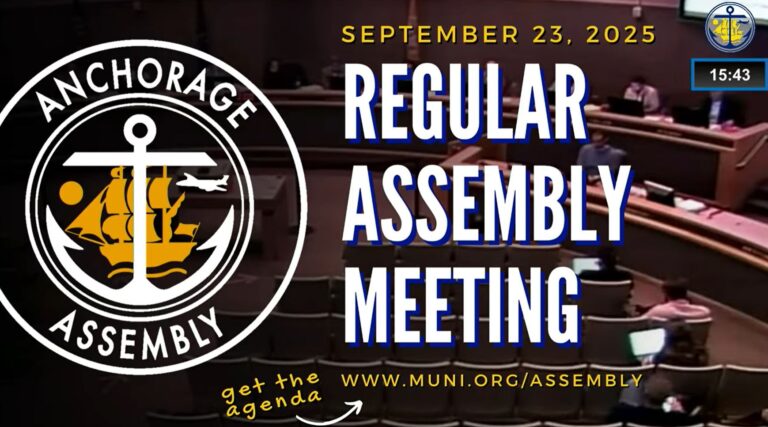By BRENDA JOSEPHSON
With early voting underway and ballots landing in mailboxes across Alaska, October 7th is your chance to make a real difference in the places we call home.
From borough assemblies to school boards and vital propositions, these municipal elections empower everyday Alaskans to guide education, infrastructure, and local services. With easy mail-in options and early voting already underway, now is the time to grab your ballot and help build the stronger communities we deserve. It is time for Alaskans to make their voices heard together!
In the capital city, the City and Borough of Juneau’s regular municipal election runs by mail from September 19 to October 7, with ballots automatically sent to registered voters. Voters will elect three Assembly seats; two incumbents are running unopposed, and in District 2 incumbent will be facing a challenger.
Juneau candidates will also vie for three board of education seats. Three propositions are on the ballot, including two citizen’s initiatives for reducing the millage rate cap and a sales tax exemption for essential food and non-commercial utilities. The third is a proposal from the local government for a seasonally adjusted sales tax that would increase in the summer months. Affordable Juneau, a local advocacy group, is urging votes of “Yes, Yes, and No” on the proposals. Drop boxes are available 24/7, with in-person voting at City Hall and Valley Library on election day from 7 a.m. to 8 p.m.
In other areas of Southeast Alaska, in Ketchikan Gateway Borough and the City of Ketchikan, voters will choose a borough mayor, assembly members, and school board members across seven precincts, with absentee voting by mail or fax.
The Haines Borough’s general municipal election will fill two seats each for assembly, planning commission, and school board. The community will also have a chance to affirm or reject the government’s proposal for a seasonal tax increase.
Skagway’s October 7th ballot has the mayor’s office running unopposed, three candidates running for two open three-year assembly seats, and a one-year assembly seat that has no names on the ballot. A seasonal sales tax is also on the ballot for Skagway that, if approved by voters, would increase sales tax from 5% to 7% during the months of April through September each year to offset utility bills and fund infrastructure projects.
The City and Borough of Wrangell’s race has two candidates running for two available three-year seats and three candidates running for one open one-year seat. Four candidates have filed to fill two open school board seats.
The City and Borough of Sitka race is competitive this year with six candidates vying for two assembly seats. In the school board race, three candidates are hoping to be elected to two open seats on the board. Also on the ballot is a proposal to allow the Sitka Community Hospital Dedicated Fund to be used for the former hospital’s debt expense and debt expense for athletic and recreation facilities.
In the Fairbanks North Star Borough, the regular municipal election covers three three-year assembly seats and two school board seats. The City of Fairbanks race will decide who will serve as mayor and fill two city council seats. Early voting runs September 22 to October 2, with polling places open 7 a.m. to 8 p.m. on October 7th.
In the Matanuska-Susitna Valley, the cities of Palmer, Wasilla, and Houston conduct independent elections. Palmer voters will elect a mayor and three council seats: two three-year terms and one one-year term. Wasilla will be filling three city council seats with two of the candidates running unopposed. Houston will also be electing council seats. These races are separate from the Mat-Su borough-wide election that will be held on November 4th.
In Southwest Alaska, the City of Bethel will be looking to fill four City Council seats with three candidates running, meaning one seat may go unfilled or to a write-in candidate. The City of Whittier has three city council seats on the ballot, with two running unopposed.
The Alaska Division of Elections administers the REAA election for school board seats in 11 rural areas within the unorganized borough, including Aleutian, Lower Yukon, Holy Cross, Lake Minchumina, Shageluk, Ruby, Koyukuk, Minto, Arctic Village, Fort Yukon, Northway, and Tok. Ballots were mailed by September 15, with early voting available from September 22 at regional offices. Polling places are open 8 a.m. to 8 p.m. on election day, October 7th.
Early and absentee voting is now underway, including in-person options from September 22. October 7th is your moment to prove all politics is local—mark your ballot today and inspire others to join the effort to shape the future of your community. For sample ballots and polling details, visit elections.alaska.gov or contact your local clerk’s office.
Your vote counts!
Brenda Josephson is a board member of Alaska Gold Communications, Inc., the publisher of Must Read Alaska. You can contact her via email at [email protected].








